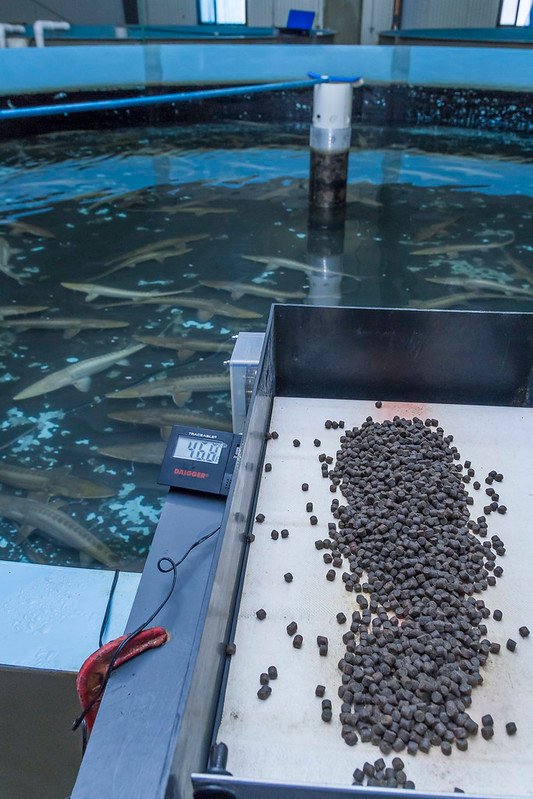By Madelyn Kearns*
The Aquaculture Stewardship Council (ASC) launched an initiative at the beginning of October aimed at helping seafood farmers not yet ready to achieve certification with improving their practices and mitigating their social and environmental impacts.
The initiative, known as the ASC Improver Program (AIP), seeks to involve seafood producers beyond just those actively looking to obtain ASC approval, even if they ultimately decide not to pursue a certificate.
“Until now there has not been guidance for producers on how to improve their practices so they can meet the requirements in the ASC standards, but the Improver Programme will help to bridge that gap,” explained Roy van Daatselaar, ASC’s producer support manager.
According to Daatselaar, ASC is hoping to engage small-scale farmers, specifically those in Asia, through its new AIP program.
“The aquaculture industry includes a significant amount of small-scale farms, particularly in Asia, and providing guidance to these producers on how to improve practices will play an important role in the ASC’s mission to raise the overall standards of aquaculture worldwide,” Daatselaar said.
The AIP initiative will provide producers with access to expertise and networking opportunities as well as encourage a pre-competitive and collaborative approach to improvement for the global aquaculture industry.
“Farmers who participate in the AIP will be supported by the ASC, and given access to tools and networks to help them succeed through the ASC’s online academy. The AIP will be open both to those producers that want to obtain certification and those that simply want help to improve farming practices without certification as an immediate goal,” ASC said in a press release detailing the launch of the program.
Individual farmers, groups of producers, and local governments are all encouraged to collaborate under the AIP paradigm, a step that has already been taken by the Vietnamese government and WWF Vietnam. The two parties have joined forces as part of the AIP program to establish a benchmark between VietGAP, the local Vietnamese certification, and the ASC standards for shrimp and tilapia.
Stay Always Informed
Join our communities to instantly receive the most important news, reports, and analysis from the aquaculture industry.
Small farms are responsible for producing 85 percent of shrimp in Vietnam, meaning that targeted guidance provided via the AIP initiative “to help [shrimp farmers] improve their practices could have a big impact on overall aquaculture standards,” ASC said.
The certifier has seen a lot of progress and partnership in Vietnam as of late. Last month, ASC announced it had teamed up with the Vietnamese Directorate of Fisheries (D-Fish) and WWF Vietnam to provide guidance documents geared at helping VietGAP-certified farmers to achieve ASC certification.
“The ASC-VietGAP benchmark has compared the Vietnamese aquaculture standard, VietGAP, and the ASC standards for shrimp, pangasius and tilapia, to allow farms that have achieved VietGAP certification to transition to ASC certification as efficiently as possible,” ASC said.
“The ASC is a global certification programme which brings many advantages to producers, but we also recognise that every region has different opportunities and challenges,” added Daatselaar, who led the work on the benchmark for ASC. “This collaboration allows us to work with local partners to put things into a regional context, to extend the reach and benefits of ASC certification.”
ASC and VietGAP standards have a lot of common ground, Daatselaar said, “so this work should help highlight these areas and build a stepping stone approach to help farmers to identify what action they might need to take to achieve ASC certification.”
“WWF Vietnam supports sustainable aquaculture, benchmarking VietGAP and ASC will support to mobilize resources and increase opportunities of good aquaculture practice products to access the global market,” noted Huynh Quoc Tinh from WWF Vietnam.
*Source: ASC
Editor at the digital magazine AquaHoy. He holds a degree in Aquaculture Biology from the National University of Santa (UNS) and a Master’s degree in Science and Innovation Management from the Polytechnic University of Valencia, with postgraduate diplomas in Business Innovation and Innovation Management. He possesses extensive experience in the aquaculture and fisheries sector, having led the Fisheries Innovation Unit of the National Program for Innovation in Fisheries and Aquaculture (PNIPA). He has served as a senior consultant in technology watch, an innovation project formulator and advisor, and a lecturer at UNS. He is a member of the Peruvian College of Biologists and was recognized by the World Aquaculture Society (WAS) in 2016 for his contribution to aquaculture.






